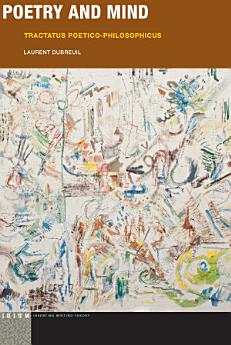Poetry and Mind: Tractatus Poetico-Philosophicus
Apr 2018 · Fordham Univ Press
Ebook
128
Pages
reportRatings and reviews aren’t verified Learn More
About this ebook
What one cannot compute, one must poetize: this essay theorizes the extraordinary regimes of human mental experience by putting the emphasis on poetry. Poetry grants us the ability to move “beyond the limits of thought” and to explore the beyond of cognition. It teaches us to think differently. An elliptic response to Wittgenstein’s point of arrival in the Tractatus, this book is first and foremost an interdisciplinary study of poetry, drawing on literary theory, philosophy, and cognitive science. The work conducted on minds and brains over the last decades in psychology, artificial intelligence, or neuroscience cannot be ignored, if, as “humanists,” we are ever interested in the way we think. Thus, a constant dialogue with the positive examination of cognition serves to better situate the normal regimes of thought—and to underline the other mental possibilities that literature opens up. This essay shows that poetry—a very widespread and possibly universal phenomenon among humans—arises through syntactic structures, cognitive binding, and mental regulations; but that, in going through them, it also exceeds them. The best poems, then, are not only thought experiments but actual thinking experiments for the unthinkable. They expand the usual semantics of natural languages, they singularly deploy the rhetorical armature of speech. They tend to exceed their own algorithms, made of iterations and linguistic re-organizations. They are often reflexive, strange, cognitively dissonant. They provide detachable, movable, and livable significations to our selves. The literary scope of this book is more than “global:” it is uniquely broad and comparative, encompassing dozens of different traditions, oral or written, from all continents, from Ancient times to the contemporary era, with some thirty specific readings of texts, ranging from Sophocles to Gertrude Stein, from Wang Wei to Aimé Césaire, or from cuneiform tablet to rap music.
About the author
Laurent Dubreuil is a Professor of Comparative Literature, Romance Studies, and Cognitive Science at Cornell University and a Senior International Professor at the Tsinghua University Institute for World Literatures and Cultures. His most recent books are The Intellective Space: Thinking Beyond Cognition and The Refusal of Politics.
Rate this ebook
Tell us what you think.
Reading information
Smartphones and tablets
Install the Google Play Books app for Android and iPad/iPhone. It syncs automatically with your account and allows you to read online or offline wherever you are.
Laptops and computers
You can listen to audiobooks purchased on Google Play using your computer's web browser.
eReaders and other devices
To read on e-ink devices like Kobo eReaders, you'll need to download a file and transfer it to your device. Follow the detailed Help Center instructions to transfer the files to supported eReaders.






